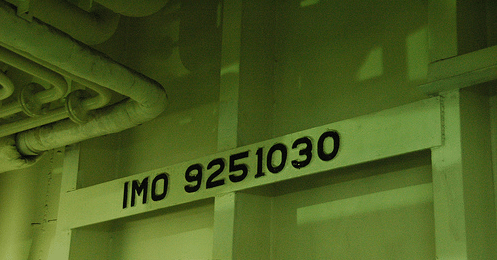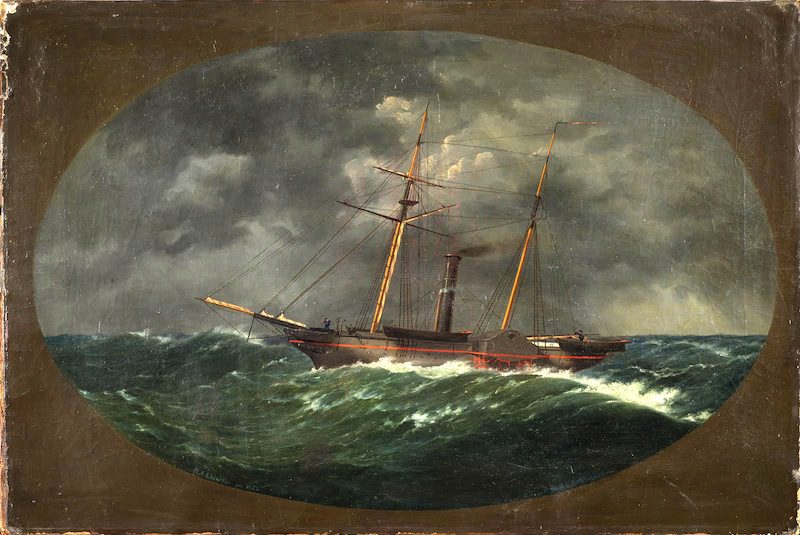Wikipedia tells us “The IMO number is made of the three letters ‘IMO’followed by the seven-digit number assigned to all ships by IHS Fairplay when constructed. This is a unique seven digit number that is assigned to propelled, sea-going merchant ships of 100 GT and above. It serves to identify ships and is not changed when the ship’s owner, country of registry or name changes.” This number makes tracking ships, via AIS and other means, over long periods of time practical.
While most mariners can tell you the significance of a ship’s IMO number, few know how the number is chosen. One of the mathematicians over at teppovuori.fi thinks he’s figured it out:
IMO Numbers are made up of the letters IMO and seven decimal digits (Six information digits followed by a seventh check digit concatenated into a seven digit number)
- The six information digits to be checked are weighted from left to right by 7, 6, 5, 4, 3 and 2.
- Products are added up.
- The sum is divided by 10. The remainder is the check digit.
Example: IMO 9074729 (Pacific Frontier, Hong Kong)
9 0 7 4 7 2 9
7 6 5 4 3 2
63 0 35 16 21 4 = 139 -> 9
The method could also be described by saying that the weighting factors are 7..2 from left to right, and the check digit is the digit that you need to subtract from the sum to make it evenly divisible by 10. Note: This was updated by a gCaptain reader
If anyone is a mathematician or cryptologist and can verify this please leave a comment below.
So what is an IMO Number anyway? The IMO says:
 As a result of the attack on the USS Cole, the events of Sept. 11, 2001 and the suicide bombing of the oil tanker Limburg, the IMO held a Diplomatic Conference on Maritime Security in December 2002. At the conference, it adopted a number of measures aimed at enhancing the security of ships and port facilities. In addition to the creation of the well-known ISPS Code, the conference also included a modification to SOLAS Regulation XI-1/3 to require ships’ identification numbers to be permanently marked in a visible place either on the ship’s hull or superstructure.
As a result of the attack on the USS Cole, the events of Sept. 11, 2001 and the suicide bombing of the oil tanker Limburg, the IMO held a Diplomatic Conference on Maritime Security in December 2002. At the conference, it adopted a number of measures aimed at enhancing the security of ships and port facilities. In addition to the creation of the well-known ISPS Code, the conference also included a modification to SOLAS Regulation XI-1/3 to require ships’ identification numbers to be permanently marked in a visible place either on the ship’s hull or superstructure.
The IMO Ship Identification Number is a unique seven-digit number assigned to propelled, seagoing vessels of 100 gross tons and above. The number is assigned by Lloyd’s Register – Fairplay Ltd. on behalf of the IMO. It consists of the three letters IMO followed by seven numbers.
It is important to note that this number is separate and different from your official number. The official number is an internal control number issued by your yacht’s flag administration and cannot be used to replace the IMO number.
gCaptain’s Short Answer: A vessel’s “IMO Number” is the single best way to track and locate history on a ship since each number is unique and is the only identification that remains with a vessel from shipyard to scrapyard.
Links:

 Join The Club
Join The Club




 As a result of the attack on the USS Cole, the events of Sept. 11, 2001 and the suicide bombing of the oil tanker Limburg, the IMO held a Diplomatic Conference on Maritime Security in December 2002. At the conference, it adopted a number of measures aimed at enhancing the security of ships and port facilities. In addition to the creation of the well-known ISPS Code, the conference also included a modification to SOLAS Regulation XI-1/3 to require ships’ identification numbers to be permanently marked in a visible place either on the ship’s hull or superstructure.
As a result of the attack on the USS Cole, the events of Sept. 11, 2001 and the suicide bombing of the oil tanker Limburg, the IMO held a Diplomatic Conference on Maritime Security in December 2002. At the conference, it adopted a number of measures aimed at enhancing the security of ships and port facilities. In addition to the creation of the well-known ISPS Code, the conference also included a modification to SOLAS Regulation XI-1/3 to require ships’ identification numbers to be permanently marked in a visible place either on the ship’s hull or superstructure.






